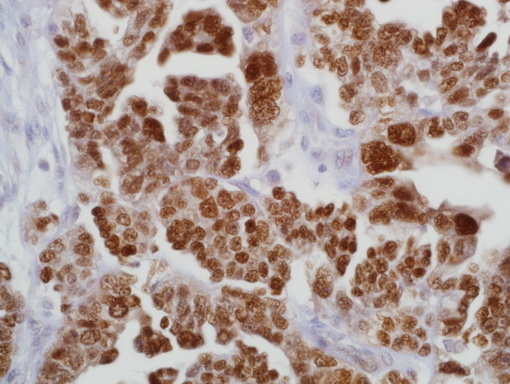PAX8 Mouse Monoclonal Antibody [Clone ID: MRQ-50]
Other products for "PAX8"
Specifications
| Product Data | |
| Clone Name | MRQ-50 |
| Applications | IHC |
| Recommended Dilution | IHC: 1:50 - 1:200 |
| Reactivities | Human |
| Host | Mouse |
| Isotype | IgG |
| Clonality | Monoclonal |
| Formulation | This antibody is supplied as cell culture supernatant diluted in tris buffered saline, pH 7.3-7.7, with 1% BSA and <0.1% sodium azide. |
| Conjugation | Unconjugated |
| Storage | Store at -20°C as received. |
| Stability | Stable for 12 months from date of receipt. |
| Gene Name | paired box 8 |
| Database Link | |
| Synonyms | OTTHUMP00000158659; OTTHUMP00000158660; paired box 8; paired domain gene 8 |
| Note | This protein is a member of the paired box (PAX) family of transcription factors. Members of this gene family typically encode proteins which contain a paired box domain, an octapeptide, and a paired-type homeodomain. This nuclear protein is involved in thyroid follicular cell development and expression of thyroid-specific genes. Mutations in this gene have been associated with thyroid dysgenesis, thyroid follicular carcinomas and atypical thyroid adenomas.PAX-8 is expressed in the thyroid (and associated carcinomas), non-ciliated mucosal cells of the fallopian tubes and simple ovarian inclusion cysts, but not normal ovarian surface epithelial cells. PAX-8 is expressed in a high percentage of ovarian serous, endometrioid, and clear cell carcinomas, but only rarely in primary ovarian mucinous adenocarcinomas. Studies have also found PAX-8 expression in renal tubules as well as renal carcinoma, nephroblastoma, and seminoma. Studies have shown that 98% of clear cell RCCs, 90% of papillary RCCs, and 95% of oncocytomas are positive for anti-PAX-8, frequencies which are similar to or better than those for anti-PAX-2. Therefore, anti-PAX-8 can be used as an additional immunohistochemical marker for renal epithelial tumors. Normal lung and lung carcinomas do not express PAX-8. Anti-PAX-8, combined with organ system-specific markers such as anti-uroplakin, anti-mammaglobin, and anti-TTF-1 can be a very useful panel to determine the primary site of invasive micropapillary carcinomas from ovary (positive staining) or from bladder, lung, and breast (negative staining). Anti-PAX-8 is also useful in distinguishing ovarian serous carcinoma from malignant mesothelioma of peritoneum. |
| Reference Data | |
| Protein Families | Druggable Genome, Transcription Factors |
| Protein Pathways | Pathways in cancer, Thyroid cancer |
Documents
| Product Manuals |
| FAQs |
{0} Product Review(s)
0 Product Review(s)
Submit review
Be the first one to submit a review
Product Citations
*Delivery time may vary from web posted schedule. Occasional delays may occur due to unforeseen
complexities in the preparation of your product. International customers may expect an additional 1-2 weeks
in shipping.






























































































































































































































































 Germany
Germany
 Japan
Japan
 United Kingdom
United Kingdom
 China
China



